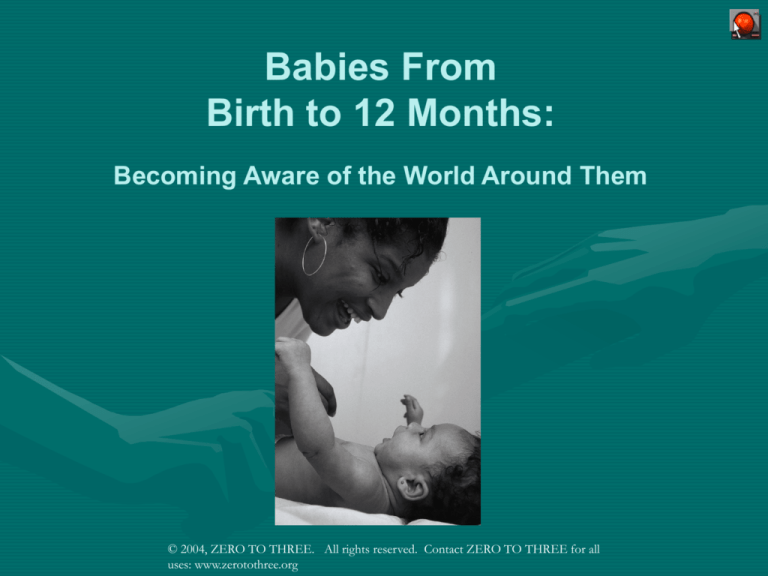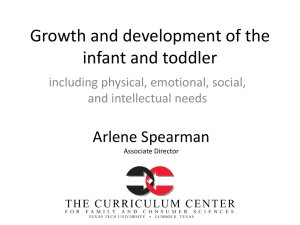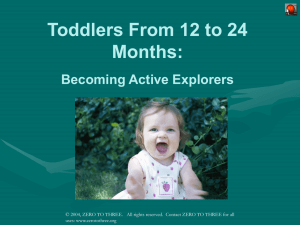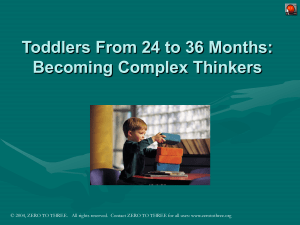
Click
Me!!
Babies From
Birth to 12 Months:
Becoming Aware of the World Around Them
© 2004, ZERO TO THREE. All rights reserved. Contact ZERO TO THREE for all
uses: www.zerotothree.org
Click
Me!!
Key Ideas
• Look for toys and
games that engage all
of your baby’s senses.
Your baby explores the world
around him using his body
and senses: eyes, ears,
nose, hands, and mouth.
She’ll touch a book, chew it,
look at it, and sometimes
even listen while you read it.
© 2004, ZERO TO THREE. All rights reserved. Contact ZERO TO THREE for all uses: www.zerotothree.org
Click
Me!!
Build on Your Baby’s Curiosity
About the World
• Toys like textured blocks, rattles, and crinkly
fabric toys give your child interesting sensory
experiences.
• Singing, infant massage, and physical play
(e.g., “riding” your baby on your lap while you
sing) also promote sensory awareness.
© 2004, ZERO TO THREE. All rights reserved. Contact ZERO TO THREE for all uses: www.zerotothree.org
Click
Me!!
Build on Your Baby’s Curiosity
About the World
• For older babies, activities like well-supervised water
play, finger painting, and exploring musical instruments
are fun ways of learning about the world.
© 2004, ZERO TO THREE. All rights reserved. Contact ZERO TO THREE for all uses: www.zerotothree.org
Click
Me!!
Key Ideas
As you play, watch your baby to see what
skills she is developing.
Children build all areas of development through play.
© 2004, ZERO TO THREE. All rights reserved. Contact ZERO TO THREE for all uses: www.zerotothree.org
Click
Me!!
Learning Through Play
• Physical Skills
Children use their whole bodies
when they play. This helps them
develop the muscle strength,
balance, and coordination they
need to learn from and explore
the world around them.
© 2004, ZERO TO THREE. All rights reserved. Contact ZERO TO THREE for all uses: www.zerotothree.org
Click
Me!!
Learning Through Play
Have you seen your baby:
– Turn his or her head toward
you or
an interesting sound?
– Reach for you or a toy?
– Roll?
– Crawl?
– Pull up?
– Cruise (walk while holding onto
a couch or low table)?
– Walk?
© 2004, ZERO TO THREE. All rights reserved. Contact ZERO TO THREE for all uses: www.zerotothree.org
Click
Me!!
Learning Through Play
• Thinking Skills
As they play and interact with loved caregivers,
babies develop thinking skills such as:
Cause and effect: “If I shake the rattle, it makes a sound.”
“If I press the button, music plays.”
Object permanence: Babies understand that things they
can’t see still exist when, for example, you hold a blanket
over your face and then take it away and say, “Peek-aboo!” Or when a ball rolls under the sofa, your baby will
discover that, if he looks for it, it will be there.
© 2004, ZERO TO THREE. All rights reserved. Contact ZERO TO THREE for all uses: www.zerotothree.org
Click
Me!!
Learning Through Play
•
Communication Skills
Babies develop communication and language skills as
they work to make their needs and feelings known to
you. They do this by using:
– Sounds: Does your baby gurgle, cry, laugh or coo to
let you know what she needs or how she is feeling?
Starting at about one year, your baby may begin
using sounds like “baba” for bottle or “mo” for more.
– Gestures: Does your baby reach for you? Point?
Pull on his ear or rub his eyes when he is tired?
Watch as your baby learns to use her body in new,
meaningful ways—waving as leave in the morning,
clapping, covering her eyes to play peek-a-boo with
you.
– Facial Expressions: Babies start to smile at about 6
weeks and their facial expressions only get more
interesting from then on. Can you “read” your baby’s
face?
© 2004, ZERO TO THREE. All rights reserved. Contact ZERO TO THREE for all uses: www.zerotothree.org
Click
Me!!
Learning Through Play
• Social Skills
Babies develop social skills as you delight in their
discoveries and make them feel important, loved, and
competent. You help your baby develop positive
social skills by:
– Responding to her cries and attempts at communication (you
can’t spoil a baby!)
– Respect her unique needs and temperament
– Finding time to spend with her one-on-one
© 2004, ZERO TO THREE. All rights reserved. Contact ZERO TO THREE for all uses: www.zerotothree.org
Click
Me!!
Learning Through Everyday Moments
It was bath time for nine-month-old Jessica. Her father gently
lowered her into the tub. Jessica immediately reached for the
red plastic measuring spoon floating in the water and started
chewing on it. Then she splashed the spoon up and down in
the water. Her dad splashed the water too.
Jessica looked surprise for a moment, and then giggled. She
splashed again and looked expectantly at her dad. He splashed
too. They both laughed this time. Then a rubber ducky caught
her attention and Jessica grabbed for it, letting go of the spoon.
The spoon dropped into the water and sank below the surface.
© 2004, ZERO TO THREE. All rights reserved. Contact ZERO TO THREE for all uses: www.zerotothree.org
Click
Me!!
Learning Through Everyday Moments
Interested in what she saw, Jessica dropped the duck and reached
under the water for the spoon. She let it go so it fell into the
water. She watched it sink and then picked it up again.
Her father caught her eye and said, “Splash! There it goes it
again! Look at that spoon sink to the bottom.” Jessica put her
fingers in her mouth and started to suck on them. “Eating your
fingers? Are you getting more teeth?” wondered her dad.
© 2004, ZERO TO THREE. All rights reserved. Contact ZERO TO THREE for all uses: www.zerotothree.org
Click
Me!!
Learning Through Everyday Moments
As he lathered up a washcloth,
Jessica’s dad sang their special
bath song, “Head and shoulders,
knees and toes, knees and toes…”
He tickled her toes with the
washcloth and Jessica giggled,
kicking her feet.
Her dad continued singing, “Eyes and
mouth and ears and nose, ears and
nose…” He kissed the tip of her
toes. Jessica laughed, splashed
her hands down into the bath and
cooed, “Daaa! Daaaa!”
© 2004, ZERO TO THREE. All rights reserved. Contact ZERO TO THREE for all uses: www.zerotothree.org
Click
Me!!
To Think About
• How is Jessica using actions and sounds to
communicate with her father? How is her father
encouraging her language development?
• What are some things that Jessica is
communicating to her dad in this story?
• What are some of the things that Jessica is
learning through her bath play?
© 2004, ZERO TO THREE. All rights reserved. Contact ZERO TO THREE for all uses: www.zerotothree.org
Click
Me!!
What Was Jessica Learning?
• Social-Emotional Skills:
Jessica’s self-esteem is boosted through this warm,
loving interaction with her father. She learns about trust
as her father handles her gently and keeps her safe.
Her dad’s kisses during the song make Jessica feel
special and loved.
© 2004, ZERO TO THREE. All rights reserved. Contact ZERO TO THREE for all uses: www.zerotothree.org
Click
Me!!
What Was Jessica Learning?
• Language and Communication skills:
Jessica is learning about back-and-forth communication
through her interactions with her dad-- kicking, cooing,
and splashing.
When they take turns playing together, Jessica and her
father are having a “conversation” of sorts.
When her father wonders “Are you getting more teeth?”
when he sees Jessica put her hands in her mouth, he
shows how attuned he is to the messages his daughter
is sending.
© 2004, ZERO TO THREE. All rights reserved. Contact ZERO TO THREE for all uses: www.zerotothree.org
Click
Me!!
What Was Jessica Learning?
• Physical Skills:
Jessica develops muscle strength
through kicking and splashing. She is
also practicing fine (small) muscle
skills by picking up and manipulating
bath toys. Sitting up while bathing
gives Jessica time to perfect her
balance and to develop back strength
as well.
© 2004, ZERO TO THREE. All rights reserved. Contact ZERO TO THREE for all uses: www.zerotothree.org
Click
Me!!
What Was Jessica Learning?
• Thinking Skills:
Jessica is learning cause and effect by kicking her legs
and then feeling the splash on her legs.
She is learning about sinking and floating (properties of
water) as she plays with the different toys in her bath.
She is learning about patterns when she realizes that
songs have a regular, logical rhythm pattern.
She is learning about words and language when her she
feels (through tickles and kisses) that words like “nose”
and “toes” represent parts of the body.
© 2004, ZERO TO THREE. All rights reserved. Contact ZERO TO THREE for all uses: www.zerotothree.org
Click
Me!!
Thinking About Your Baby
•
•
•
As you play with your baby during bath
time, what are some of the things you
see him/her learning?
What are some of the ways your baby
communicates with you?
What are some ways you can make bath
time a time for learning and bonding with
your baby?
© 2004, ZERO TO THREE. All rights reserved. Contact ZERO TO THREE for all uses: www.zerotothree.org
Click
Me!!
Common Questions
About Babies and Play
• My three-month-old seems to only be
interested in interacting with me or
playing for a few minutes at a time. Is
this normal?
© 2004, ZERO TO THREE. All rights reserved. Contact ZERO TO THREE for all uses: www.zerotothree.org
Click
Me!!
Common Questions
About Babies and Play
• Young babies have a fairly
short attention span. They are
easily overwhelmed and
usually only “play” (interact
with you, make eye contact,
and/or play with toys) for brief
periods of time.
• Watch your baby to learn what
his “I’m overwhelmed” cues
are. When he’s ready to stop
playing, you can give him the
down-time he needs.
• Babies have their own ways of
letting you know when they are
done playing. They might cry
or fuss, rub their eyes or turn
away from you, or just fall
asleep.
© 2004, ZERO TO THREE. All rights reserved. Contact ZERO TO THREE for all uses: www.zerotothree.org
Click
Me!!
Common Questions
About Babies and Play
• My six-month-old hates
her jack-in-the-box, the
same toy my son loved.
In fact, she is so afraid of
it that I’ve had to put it
away. What does this
mean?
© 2004, ZERO TO THREE. All rights reserved. Contact ZERO TO THREE for all uses: www.zerotothree.org
Click
Me!!
Common Questions
About Babies and Play
• Children (and even adults) take in and react to sensory
experiences differently and have different tolerance
levels for how much noise, lights and stimulation they
can cope with before they feel overwhelmed.
• It sounds like for your daughter, the loud, fast, and
surprising movement of the jack-in-the-box may be too
much for her. Look for other toys that offer a similar
cause and effect experience as the jack-in-the-box such
as rattles or toy pianos where she can press a key and
hear a tone
© 2004, ZERO TO THREE. All rights reserved. Contact ZERO TO THREE for all uses: www.zerotothree.org
Click
Me!!
Common Questions
About Babies and Play
• My ten-month-old really likes to do things with
hands. She will look at and handle a toy over
and over again. But she is not really into
crawling all around like other kids in the
playgroup we attend. Should I worry?
© 2004, ZERO TO THREE. All rights reserved. Contact ZERO TO THREE for all uses: www.zerotothree.org
Click
Me!!
Common Questions
About Babies and Play
• Every baby has his or her own preferences
for how to explore the world. Some babies
are observers—they learn by watching
and by carefully exploring specific toys or
objects. Other babies prefer to learn on
the move.
• For your little observer, look for engaging
toys that will build on her desire to explore
with her hands. Think about shape
sorters, textured blocks, and other toys
that encourage handling and observation.
© 2004, ZERO TO THREE. All rights reserved. Contact ZERO TO THREE for all uses: www.zerotothree.org
Click
Me!!
Common Questions
About Babies and Play
• You can also promote your daughter’s
movement skills. Try placing an
interesting toy at some distance from
her and encourage her to move toward
it. Or you can put music on and dance
with her. Play with a textured ball (like
one with soft bumps) that encourages
both tactile exploration and active play.
• If your daughter continues to show little
interest in moving or if you have any
questions about her physical
development, talk to your pediatrician
and ask whether a developmental
assessment would make sense.
© 2004, ZERO TO THREE. All rights reserved. Contact ZERO TO THREE for all uses: www.zerotothree.org
Click
Me!!
Ideas for Playing With Baby
• Ready, Set, Crawl! To help
your baby develop neck,
shoulder, and forearm
strength, slide a small pillow or
rolled-up towel under your
baby’s arms and chest while
she lies on her tummy. Put
some interesting toys in front
of her and encourage her to
reach for them.
• Play rocket ship. Try this
when baby is about 4 months
old or older. Sit on the floor
with baby facing you (holding
her with her tummy against
your shins). Say, “3-2-1 …
Take-off!” Roll back and gently
lift your legs while holding
baby securely. Let her “fly” for
a few minutes.
© 2004, ZERO TO THREE. All rights reserved. Contact ZERO TO THREE for all uses: www.zerotothree.org
Click
Me!!
Ideas for Playing With Baby
• Sway, baby, sway! Place your baby on her back on a small
blanket. You and another adult grab all four corners of the blanket
and rock baby gently back and forth. This helps your baby develop
an awareness of how her body feels in space as she sways upand-down, back-and-forth on the blanket.
• Who’s the fairest of them all? Hold your baby in front of the
mirror. Say and point to her body parts—eyes, nose, mouth, arms,
etc. Then play peek-a-boo. Step away from the mirror and ask
“Where did baby go?” Move back in front of the mirror and say,
“There’s [your baby’s name]!” This game helps your baby
understand that she is her own person, separate from you.
© 2004, ZERO TO THREE. All rights reserved. Contact ZERO TO THREE for all uses: www.zerotothree.org
Click
Me!!
Developmental Milestones:
Birth to 12 months
• This list of achievements is not inclusive of everything
your baby will learn, but it does give you a sense of the
many skills she is working on during her first year.
• Keep in mind that children develop at their own pace and
in their own way. Your child may reach a particular
milestone earlier or later in the timeframe.
• This list has been adapted from Bringing Up Baby:
Three Steps to Making Good Decisions in Your Child’s
First Years by Claire Lerner and Amy Laura Dombro, and
printed by the Zero to Three Press
(www.zerotothree.org/press).
© 2004, ZERO TO THREE. All rights reserved. Contact ZERO TO THREE for all uses: www.zerotothree.org
Click
Me!!
Developmental Milestones:
Birth to 12 months
Your baby learns what her body can do.
• Sucking soothes me.
• I recognize the smell and voices of those caring for
me the most.
• I connect sounds with their sources. My favorite
sound is the human voice.
• I have a good grip as a newborn. By about three
months, I will start to reach and grasp things with my
hands.
• I will learn to hold my head up, roll, and probably
crawl. I can stand if I hold onto something, and might
even be walking.
© 2004, ZERO TO THREE. All rights reserved. Contact ZERO TO THREE for all uses: www.zerotothree.org
Click
Me!!
Developmental Milestones:
Birth to 12 months
Your baby learns about her feelings
and who she is.
• I feel loved when you hold me, smile at me, and
talk with me.
• Sometimes I startle, get frightened, or feel
overwhelmed, and I need some help to settle down.
• I learn to comfort myself. I may suck on my fingers
or hands, use a pacifier, or touch my favorite
blanket or stuffed animal.
• I can show you my feelings through my voice, my
facial expressions, and my body movements.
© 2004, ZERO TO THREE. All rights reserved. Contact ZERO TO THREE for all uses: www.zerotothree.org
Click
Me!!
Developmental Milestones:
Birth to 12 months
Your baby learns about people, objects, and how things work.
• I learn I can make things
happen. I can shake a rattle
and make a sound. I can
kick my bathwater and
make it splash. I can smile,
and you will smile back.
• By 3 months, I realize that if
something “disappears,” it
continues to exist even if I
can’t see it anymore. I
might cry extra hard when
you leave me now, because
I know you are still out there
somewhere.
• By 6 months, I can tell the
difference between people I do
and don’t know. Try to be
patient, and help me feel
comfortable with new people.
• By 9 months, I can pick things
up with my fingers. Watch out,
I will try to pick up everything I
find and might even put it in my
mouth to see how it tastes.
This is a good time to make
baby-proof the house!
© 2004, ZERO TO THREE. All rights reserved. Contact ZERO TO THREE for all uses: www.zerotothree.org
Click
Me!!
Developmental Milestones:
Birth to 12 months
Your baby learns to communicate and relate to
others.
I love to “talk” to you. Even though I don’t use words yet, I have
different cries for when I am hungry, tired, or overwhelmed. I try to
tell you what I’m thinking and feeling by using my voice, face, and
gestures.
By 3 or 4 months, I begin to babble to you. I love talking! By the time I
am a year old, I might even say my first word.
I learn to talk when you talk to me. Research shows that parents who
talk the most to their children raise children with the largest
vocabularies.
© 2004, ZERO TO THREE. All rights reserved. Contact ZERO TO THREE for all uses: www.zerotothree.org
Click
Me!!
For More Information
• Visit ZERO TO THREE’s Child Development Key
Topic.
• Visit ZERO TO THREE’s School Readiness
Interactive site, where you can learn how babies
develop key skills through everyday moments
with you and other loved ones.
© 2004, ZERO TO THREE. All rights reserved. Contact ZERO TO THREE for all uses: www.zerotothree.org










